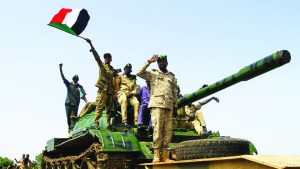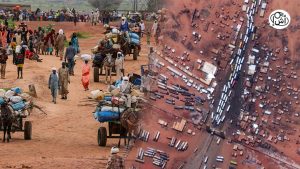Amid the risk of famine in Sudan, Western reports speak of Ukrainian groups involved in the conflict alongside Sudanese army forces.
According to the Wall Street Journal, Ukraine provided military support to the Sudanese army in its fight against the Rapid Support Forces, and sent commandos to fight alongside government forces, as this unexpected alliance aims to disrupt any Russian role in Sudan and raise the costs of Russian economic operations abroad, and the newspaper’s report reveals details that led to the escalation of fighting and increased the suffering of Sudanese cities, in addition to the Sudanese army making gains on the ground at the expense of the Rapid Support Forces.

The International Military Game
The Ukrainian participation is not expected to be without prior coordination with the “Western alliance”, as the contacts that led to the entry of Ukrainians into the battlefield remain exposed, at least to the US intelligence services cooperating closely with Kiev, according to the newspaper’s report, the roots of this alliance go back to a call from the army commander, Abdel Fattah Al-Burhan, to Ukrainian President Volodymyr Zelensky, after Sudan secretly supported Ukraine with weapons in 2022, and the contacts accelerated after that led to the landing of Ukrainian special forces in Sudan to launch operations against the RSF.
The details of this novel indicate the dimensions of what the West is working on by employing the Ukrainian war in the world, where Ukrainian forces help deliver high-precision Turkish Bayraktar drones for use in Sudan, in addition to training Sudanese soldiers, as the Sudanese army’s successes in regaining control of parts of Omdurman are due to precision strikes with drones, in addition to that, Kiev sent a shipment of wheat flour to Port Sudan to deepen relations between the two countries.
The newspaper report opens the door wide to the international dimensions of the current conflict and the deep humanitarian crisis it has caused. It focuses on Kyiv, which is facing a major crisis in its war against Russia. Despite its limited political role, Kyiv assumes broader roles by supporting a Sudanese faction, surpassing its clearly defined political role to become a military agent for Western interests in Sudan.

Humanitarian dimensions of conflict expansion
The newspaper’s report only referred to the military aspect of the Ukrainian intervention, but the background on which these battles stand has another human depth, the escalation of fighting and the replacement of the diplomatic effort with the support of one party at the expense of another threatens the Sudanese today with the threat of famine, which appeared through the warnings of the World Food Program that 95% of the Sudanese suffer from hunger, and according to the director of the World Food Program, Cindy McCain, “the battles that caused thousands of deaths and led to the displacement of eight million people, threaten the lives of millions as well as threaten peace and stability. “Twenty years ago, Darfur witnessed the largest hunger crisis in the world and the world united its efforts to confront it, but the Sudanese are forgotten today,” she said.
According to Médecins Sans Frontières, “a child dies every two hours in the Zamzam refugee camp in Darfur,” and 18 million Sudanese suffer from severe food insecurity, while the humanitarian workers who help them suffer from difficulties in movement and a significant lack of funding, at a time when the Sudanese Foreign Ministry said, in a statement published by the official news agency, that it notified the United Nations of the government’s approval to use the Tine crossing from Chad to El Fasher (the capital of North Darfur state) to enter aid. Specific humanity, after agreement on technical aspects between the Sudanese and Chadian governments and in accordance with Security Council resolution 1591.

Sudan’s conflict has evolved into a political stalemate accompanied by a sharp power struggle, which has turned the country into a battlefield, leaving a war in the capital, Khartoum, where the sounds of drone strikes resonate, and in addition to direct losses that have killed more than 13,000 people, the war has displaced millions, forcing them to flee their homes in search of safety, often crossing borders into neighboring countries already grappling with their crises.
In the broader picture, there is a humanitarian crisis that stands on an area of support for the conflict, and diplomatic efforts that hide hidden forms of support through parties such as Ukraine, so that diplomacy remains dependent on military support operations in the first place, as the hunger crisis in Sudan is an emergency that requires a multifaceted response and not military aid, as a political solution in the end is the one that will end the risk of famine and stop the flows of weapons that exacerbate the conflict.
Written by Nidal Al-Khedary
Washington completes its departure from “Air Base 101” in Niger
